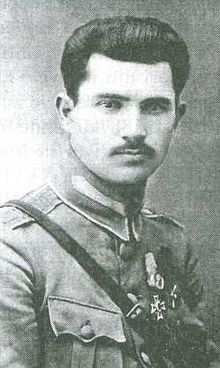Gherman Pântea
| Gherman V. Pântea | |
|---|---|
 |
|
| Born |
May 13, 1894 Zăicani |
| Died | February 1, 1968 (aged 73) Bucharest |
| Buried at | Bellu cemetery |
| Allegiance |
Russian Empire Moldavian Democratic Republic Romania |
| Service/branch |
Imperial Russian Army Bessarabian Army Romanian Land Forces |
| Years of service | 1915–1917 1917–1919 1941 |
| Rank |
Podporuchik Major |
| Awards |
Order of St. George Moldavian Order of St. Vladimir |
| Signature | |
Gherman V. Pântea (Romanian pronunciation: [ˈɡerman ˈpɨnte̯a]; surname also spelled Pîntea; Russian: Герман Васильевич Пынтя, German Vasilievich Pyntya; Ukrainian: Герман Васильович Пинтя, Herman Vasilyovich Pyntya or Pintia; May 13, 1894 – February 1, 1968) was a Bessarabian-born soldier, civil servant and political figure, active in the Russian Empire and Romania. As an officer of the Imperial Russian Army during most of World War I, he helped organize the committees of Bessarabian soldiers, oscillating between loyalty to the Russian Provisional Government and the cause of Bessarabian emancipation. Pântea was subsequently Military Director of the Moldavian Democratic Republic, answering to President Ion Inculeț. He personally created a Bessarabian defense force, tasked with combating Bolshevik subversion and Russian intimidation, but also braced for defeat after the October Revolution.
With some hesitance, Gherman Pântea endorsed the Republic's union with Romania, affiliating with the local Bessarabian Peasants' Party, then with Romania's National Liberals. Having parallel careers as teacher, lawyer and journalist, Pântea remained a presence in Romanian political life, as member of Parliament, negotiator of détente with the Soviet Union, and three times Mayor of Chișinău. He was however mistrusted for his defense of arrested Bolsheviks, his critique of centralized government, and his alleged corruption. During World War II, Pântea was Mayor of Odessa under a Romanian occupation. He intervened to save Jews from the 1941 Massacre and the subsequent deportations to camps in Transnistria. He had a tumultuous relationship with Ion Antonescu, the Romanian dictator, and was kept in check by the occupation authority. His administration managed to set in motion a plan for Odessa, and helped the city overcome devastation through the adoption of free trade, but also created various controversies.
...
Wikipedia
